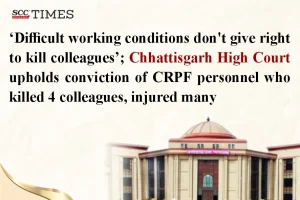Chhattisgarh High Court: In a criminal appeal filed by a Central Reserve Police Force (‘CRPF’) constable against his conviction under Sections 302 and 307 of the Penal Code, 1860(‘IPC’), along with Sections 25(1B)(a) and 27(1) of the Arms Act, 1959(‘Arms Act’) for killing 4 and injuring 1 of his fellow personnel, the Division Bench of Ramesh Sinha*, CJ., and Bhibhu Datta Guru, J., rejected the appeal, holding that the prosecution successfully proved its case and the Trial Court made no error in convicting the accused.
Background
In the present case, the accused had a rivalry with the deceased victim 1, a Sub-Inspector, regarding allotment of duty, and the other four victims supported deceased victim 1. On the date of the incident, the accused kept his service rifle illegally in his barracks, went to the subordinate officers’ restroom, and fired indiscriminately at the victims. After the incident, victim 4, who was hiding for safety behind the entertainment room, was shot and killed by the appellant. As such, the accused killed four and injured one CRPF personnel.
Thereafter, an FIR was lodged, and the accused was convicted under Sections 302 and 307 of the IPC along with Sections 25(1B)(a) and 27(1) of the Arms Act. Hence, he filed this appeal.
Analysis
At the outset, the Court noted that the accused and victims were CRPF personnel deployed in the Naxal-affected area of the State whose deaths were undisputedly homicidal in nature as they died due to haemorrhagic shock due to gunshot injuries. This was corroborated by the doctors who conducted the post-mortem of the deceased. The Court stated that the Trial Court dealt with the issue of the homicidal nature of deaths in detail, based on evidence, and its findings were neither perverse nor contrary to the record. Thus, the Court affirmed the same.
The Court noted that witness explained his struggle with the accused to stop him after he fired at the victims, wherein he sustained injuries too. The witness stated that when he asked the accused about what happened, the accused stated that he cleaned the filth of the camp and some more had to be cleaned. Thereafter, two more personnel came and helped the witness in snatching the rifle from the accused. Similar depositions were given by the two aforementioned personnel. The Court also considered the deposition of another witness personnel who witnessed the incident or the consequences thereof, thereby corroborating the prosecution story and pointing towards the guilt of the accused.
The Court further noted that the accused attempted to portray that he was implicated in a false case because he protested the illegal killing of an innocent villager. However, he gave no explanation as to how the four victims died from bullet injuries and one personnel sustained injuries when there was no Naxal attack on the camp. If there had been any Naxal attack, it would have been reported to the police.
Noting the aforesaid, the Court stated that there were several eyewitness testimonies of the members of the armed forces who were present at the camp where the incident occurred. Further, the injured victim, who corroborated the prosecution case in his testimony, carried significant evidentiary weight. The Court stated that these testimonies could not be dismissed as unreliable unless there were pellucid and substantial discrepancies or contradictions that undermined their credibility. The Court noted that,
“If there is any exaggeration in the deposition that is immaterial to the case, such exaggeration should be disregarded; however, it does not warrant the rejection of the entire evidence.”
On the contrary, from the evidence of the witnesses, the Court stated that it appeared that the accused was angry with the deceased victims because they complained that he used to leave the post/camp and go out daily for unwanted reasons. He was also scolded by his senior officers and advised not to go out of the camp. Furthermore, one of the deceased victims nominated the accused for attending a Dog Handler Course, due to which the accused was not granted leave. Thus, the accused had a grudge against the deceased victim.
The Court remarked that the working conditions of armed forces personnel can be extremely dangerous and deadly, involving exposure to a variety of hazards both in combat and peacetime situations. These hazards can lead to both immediate and long-term health problems, injuries, and even fatalities. However, they are adequately trained to face all sorts of pressures. The Court further remarked,
“Long working hours without leave and difficult environment does not give the right to any person to vent his anger by causing the death of his own colleagues.”
The accused, being a member of the armed force, was responsible for the security and safety of the people of the area from the Naxalites, but instead of performing his duty, he took a drastic measure by firing indiscriminately upon his fellow members, which, by no stretch of imagination fell under Section 304 Part I or II of the IPC. The Court stated that the appellant was aware of the consequences, and ordinarily, a member of the armed force is issued only one rifle, but the accused was carrying two and had used both, which suggested that he had premeditated for causing the crime in question.
Thus, upon analysing the prosecution depositions, the Court held that the prosecution was successful in proving its case beyond a reasonable doubt, and the Trial Court did not commit any legal or factual error in finding the accused guilty.
Accordingly, the appeal was dismissed, and the convict was directed to serve his sentence awarded by the Trial Court.
[Sant Kumar v. State of Chhattisgarh, 2025 SCC OnLine Chh 6198, decided on 19-06-2025]
*Judgment authored by: Chief Justice Ramesh Sinha
Advocates who appeared in this case:
For the petitioner: Senior Advocate Fouzia Mirza and Navin Shukla
For the respondent: Shashank Thakur, Dy. Advocate General


